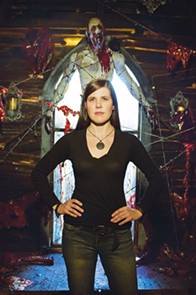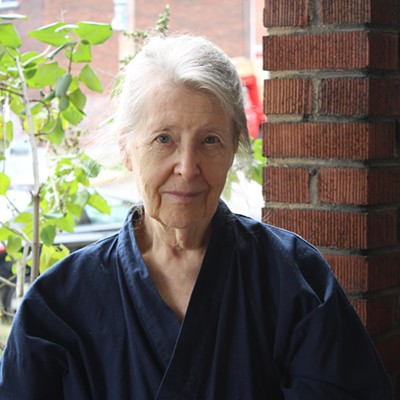When Margee Kerr set out to write a book about fear, she never imagined she would have to experience it herself.
The Aspinwall-based sociologist, a nationally recognized fear expert, initially intended for Scream: Chilling Adventures in the Science of Fear (PublicAffairs) to explore the subject scientifically.
“We seek fear out as entertainment, so I wanted to figure out why we do that,” says Kerr. “But [the book] was going to be more of a translation of research.”
Then her editor suggested the book would benefit from a personal narrative. So Kerr visited a few of the world’s scariest attractions, like Takabisha, in Japan, the steepest rollercoaster in the world, and experienced them for herself.
In Scream, Kerr weaves those detailed personal accounts between their extensive histories and the science of fear.
Kerr wasn’t worried about undertaking those adventures: She is a self-described “thrill-seeker” who traded an office job with the VA Pittsburgh Healthcare System for a research position at Etna’s Scarehouse, where she observes visitors and collects data to help make the famous haunted attraction even scarier. (She also teaches at Robert Morris, Pitt and Chatham University.)
However, Kerr quickly discovered she wasn’t quite as fearless as she thought. She was surprised to find herself frozen, legs shaking, as she scaled the 1,815-foot CN Tower, in Toronto, and suffering anxiety before sleeping alone in an underground cell at Philadelphia’s abandoned Eastern State Penitentiary. “Good-bye, detached analytical sociologist,” she writes. “Hello, primal self.”
Scream, which has received press mentions nationally, also explores how other countries approach horror. Take Japan, where there is a strong fascination with “bad deaths,” resulting in an abundance of stories and haunted attractions that feature disgruntled ghosts. This differs from South American countries, where horror stories typically mirror real threats there, such as kidnappings or violence by the military or guerilla groups.
At its core, however, Scream is a ringing endorsement of a biological response we often try to avoid. “I hope that people who read [Scream] are inspired to challenge themselves and do things they think are scary.”
By pushing our limits, Kerr argues, we discover aspects of ourselves we might not realize are there.
As she writes in Scream, “We have the ability to be strong and resilient, but we have to have chances to prove that to ourselves, so that we know and we feel that we can handle it.”














